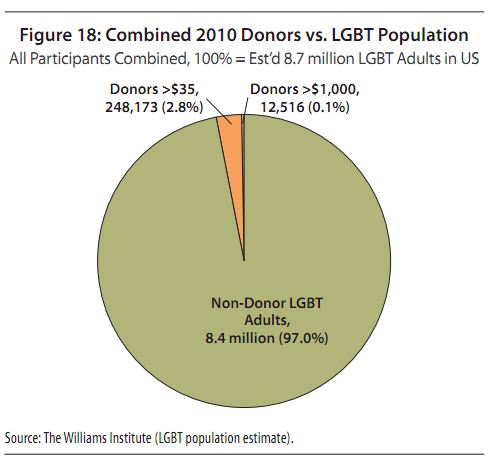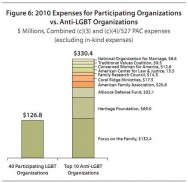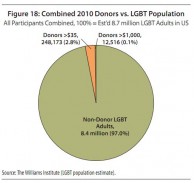National
Study: Anti-gay groups far more effective than LGBT groups at soliciting cash
Only 3 percent of community contributing to organizations


The MAP survey emphasizes the shocking disparity between revenue at pro-LGBT organizations vs. anti-LGBT organizations. (Courtesy Movement Advancement Project)
According to a report released last week by the Movement Advancement Project (MAP), American anti-gay groups are still far more effective than LGBT rights organizations at mobilizing their funding base.
The National LGBT Movement Report, which according to ThinkProgress‘s Zack Ford “analyzes the financial documents of 40 prominent LGBT organizations,” MAP estimates the number of individual donors to LGBT organizations only three percent of LGBT Americans.
The report estimates that most LGBT groups rely on just ten contributors for 45 percent of their annual income. The other 55 percent is made up of smaller donations. Ninety-seven percent of the estimated 8.7 million LGBT Americans decline to contribute to these organizations at all.
“There are many reasons for the relative dearth of donations coming from within our own community, but coming from the Midwest, I can tell you that many of our national organizations aren’t very well known in the interior of the country,” Interim Executive Director of Stonewall Democrats, Jerame Davis, told the Blade. “H.R.C., Stonewall Democrats, PFLAG, and Lambda Legal are the only organizations we heard from on a consistent basis in Indiana. Go ask your average Midwestern LGBT person to name even five national LGBT organizations; something tells me they wouldn’t get past number three.”
MORE IN THE BLADE: PRAISE, CRITICISM AS HRC ENTERS A NEW ERA
More alarming is that the ten largest openly anti-LGBT groups spend almost three times as much annually as all 40 of the LGBT groups measured; at $330.4 million versus the $126.8 million spent collectively. Multi-issue anti-LGBT organizations such as Focus on the Family, Heritage Foundation and Alliance Defense Fund had budgets dwarfing most LGBT organizations, assisted by smaller but more focused organizations like National Organization for Marriage, Family Research Council and the Traditional Values Coalition.
ThinkProgress adds that many of the donors to LGBT organizations are actually straight allies, which may mean that the number of LGBT Americans contributing to these organizations is actually lower than the estimate in the MAP report.

LGBT organizations are having a difficult time convincing American LGBT people to invest in their work. (Courtesy Movement Advancement Project)
The report surveyed 40 of the most prominent LGBT organizations in the nation from the Human Rights Campaign, the National Gay & Lesbian Task Force, and Victory Fund, Gay and Lesbian Alliance Against Defamation, and National Center for Lesbian Rights to smaller organizations like Log Cabin Republicans, SoulForce, the Trevor Project, and In The Life Media, and even some state-wide and local organizations like Empire State Pride Agenda, Equality California, and the New York City Gay & Lesbian Anti-Violence Project.
According to the report, Focus on the Family on its own out fund-raised all 40 LGBT organizations collectively.
Stonewall’s Davis believes that if organizations invested more time in creating a presence in ‘middle America,’ LGBT donors may be more willing to contribute.
“It has been a regular complaint from those in ‘flyover country’ that the national LGBT movement needs to focus more on the very clear and obvious lack of equilibrium in equality around the country,” Davis told the Blade. “The stark imbalance when you look at a state like Indiana vs. a state like New York makes it hard for folks in those states with less equality to believe the national movement is working for them. That turns off a lot of potential donors who are motivated to give, but feel they have few outlets to do so that will directly impact their daily lives.”
Some good news reported by MAP, however, is that most of the 40 organizations studied have turned their finances around from a 2009 low, with revenue exceeding expenses this year — contrasting with 2009 when expenses outpaced revenue — and most LGBT organizations report a general increase in revenue coupled with a general decrease in expenses.
LGBT organizations have also kept control of the cost of fundraising with only 11 percent annual expenses on average going toward fundraising at the 40 largest LGBT organizations, and the other 89 percent of expenses being split between programs & services (79 percent) and operations (ten percent).
The White House
Four states to ignore new Title IX rules protecting transgender students
Biden administration last Friday released final regulations

BY ERIN REED | Last Friday, the Biden administration released its final Title IX rules, which include protections for LGBTQ students by clarifying that Title IX forbids discrimination based on sexual orientation and gender identity.
The rule change could have a significant impact as it would supersede bathroom bans and other discriminatory policies that have become increasingly common in Republican states within the U.S.
As of Thursday morning, however, officials in at least four states — Oklahoma, Louisiana, Florida, and South Carolina — have directed schools to ignore the regulations, potentially setting up a federal showdown that may ultimately end up in a protracted court battle in the lead-up to the 2024 elections.
Louisiana State Superintendent of Education Cade Brumley was the first to respond, decrying the fact that the new Title IX regulations could block teachers and other students from exercising what has been dubbed by some a “right to bully” transgender students by using their old names and pronouns intentionally.
Asserting that Title IX law does not protect trans and queer students, Brumley states that schools “should not alter policies or procedures at this time.” Critically, several courts have ruled that trans and queer students are protected by Title IX, including the 4th U.S. Circuit Court of Appeals in a recent case in West Virginia.
In South Carolina, Schools Supt. Ellen Weaver wrote in a letter that providing protections for trans and LGBTQ students under Title IX “would rescind 50 years of progress and equality of opportunity by putting girls and women at a disadvantage in the educational arena,” apparently leaving trans kids out of her definition of those who deserve progress and equality of opportunity.
She then directed schools to ignore the new directive while waiting for court challenges. While South Carolina does not have a bathroom ban or statewide “Don’t Say Gay or Trans” law, such bills continue to be proposed in the state.
Responding to the South Carolina letter, Chase Glenn of Alliance For Full Acceptance stated, “While Supt. Weaver may not personally support the rights of LGBTQ+ students, she has the responsibility as the top school leader in our state to ensure that all students have equal rights and protections, and a safe place to learn and be themselves. The flagrant disregard shown for the Title IX rule tells me that our superintendent unfortunately does not have the best interests of all students in mind.”
Florida Education Commissioner Manny Diaz also joined in instructing schools not to implement Title IX regulations. In a letter issued to area schools, Diaz stated that the new Title IX regulations were tantamount to “gaslighting the country into believing that biological sex no longer has any meaning.”
Governor Ron DeSantis approved of the letter and stated that Florida “will not comply.” Florida has notably been the site of some of the most viciously anti-queer and anti-trans legislation in recent history, including a “Don’t Say Gay or Trans” law that was used to force a trans female teacher to go by “Mr.”
State Education Supt. Ryan Walters of Oklahoma was the latest to echo similar sentiments. Walters has recently appointed the right-wing media figure Chaya Raichik of Libs of TikTok to an advisory role “to improve school safety,” and notably, Raichik has posed proudly with papers accusing her of instigating bomb threats with her incendiary posts about LGBTQ people in classrooms.
The Title IX policies have been universally applauded by large LGBTQ rights organizations in the U.S. Lambda Legal, a key figure in fighting anti-LGBTQ legislation nationwide, said that the regulations “clearly cover LGBTQ+ students, as well as survivors and pregnant and parenting students across race and gender identity.” The Human Rights Campaign also praised the rule, stating, “rule will be life-changing for so many LGBTQ+ youth and help ensure LGBTQ+ students can receive the same educational experience as their peers: Going to dances, safely using the restroom, and writing stories that tell the truth about their own lives.”
The rule is slated to go into effect Aug. 1, pending any legal challenges.
****************************************************************************

Erin Reed is a transgender woman (she/her pronouns) and researcher who tracks anti-LGBTQ+ legislation around the world and helps people become better advocates for their queer family, friends, colleagues, and community. Reed also is a social media consultant and public speaker.
******************************************************************************************
The preceding article was first published at Erin In The Morning and is republished with permission.
Pennsylvania
Malcolm Kenyatta could become the first LGBTQ statewide elected official in Pa.
State lawmaker a prominent Biden-Harris 2024 reelection campaign surrogate

Following his win in the Democratic primary contest on Wednesday, Pennsylvania state Rep. Malcolm Kenyatta, who is running for auditor general, is positioned to potentially become the first openly LGBTQ elected official serving the commonwealth.
In a statement celebrating his victory, LGBTQ+ Victory Fund President Annise Parker said, “Pennsylvanians trust Malcolm Kenyatta to be their watchdog as auditor general because that’s exactly what he’s been as a legislator.”
“LGBTQ+ Victory Fund is all in for Malcolm, because we know he has the experience to win this race and carry on his fight for students, seniors and workers as Pennsylvania’s auditor general,” she said.
Parker added, “LGBTQ+ Americans are severely underrepresented in public office and the numbers are even worse for Black LGBTQ+ representation. I look forward to doing everything I can to mobilize LGBTQ+ Pennsylvanians and our allies to get out and vote for Malcolm this November so we can make history.”
In April 2023, Kenyatta was appointed by the White House to serve as director of the Presidential Advisory Commission on Advancing Educational Equity, Excellence and Economic Opportunity for Black Americans.
He has been an active surrogate in the Biden-Harris 2024 reelection campaign.
The White House
White House debuts action plan targeting pollutants in drinking water
Same-sex couples face higher risk from environmental hazards

Headlining an Earth Day event in Northern Virginia’s Prince William Forest on Monday, President Joe Biden announced the disbursement of $7 billion in new grants for solar projects and warned of his Republican opponent’s plans to roll back the progress his administration has made toward addressing the harms of climate change.
The administration has led more than 500 programs geared toward communities most impacted by health and safety hazards like pollution and extreme weather events.
In a statement to the Washington Blade on Wednesday, Brenda Mallory, chair of the White House Council on Environmental Quality, said, “President Biden is leading the most ambitious climate, conservation, and environmental justice agenda in history — and that means working toward a future where all people can breathe clean air, drink clean water, and live in a healthy community.”
“This Earth Week, the Biden-Harris Administration announced $7 billion in solar energy projects for over 900,000 households in disadvantaged communities while creating hundreds of thousands of clean energy jobs, which are being made more accessible by the American Climate Corps,” she said. “President Biden is delivering on his promise to help protect all communities from the impacts of climate change — including the LGBTQI+ community — and that we leave no community behind as we build an equitable and inclusive clean energy economy for all.”
Recent milestones in the administration’s climate policies include the U.S. Environmental Protection Agency’s issuance on April 10 of legally enforceable standard for detecting and treating drinking water contaminated with polyfluoroalkyl substances.
“This rule sets health safeguards and will require public water systems to monitor and reduce the levels of PFAS in our nation’s drinking water, and notify the public of any exceedances of those levels,” according to a White House fact sheet. “The rule sets drinking water limits for five individual PFAS, including the most frequently found PFOA and PFOS.”
The move is expected to protect 100 million Americans from exposure to the “forever chemicals,” which have been linked to severe health problems including cancers, liver and heart damage, and developmental impacts in children.
An interactive dashboard from the United States Geological Survey shows the concentrations of polyfluoroalkyl substances in tapwater are highest in urban areas with dense populations, including cities like New York and Los Angeles.
During Biden’s tenure, the federal government has launched more than 500 programs that are geared toward investing in the communities most impacted by climate change, whether the harms may arise from chemical pollutants, extreme weather events, or other causes.
New research by the Williams Institute at the UCLA School of Law found that because LGBTQ Americans are likelier to live in coastal areas and densely populated cities, households with same-sex couples are likelier to experience the adverse effects of climate change.
The report notes that previous research, including a study that used “national Census data on same-sex households by census tract combined with data on hazardous air pollutants (HAPs) from the National Air Toxics Assessment” to model “the relationship between same-sex households and risk of cancer and respiratory illness” found “that higher prevalence of same-sex households is associated with higher risks for these diseases.”
“Climate change action plans at federal, state, and local levels, including disaster preparedness, response, and recovery plans, must be inclusive and address the specific needs and vulnerabilities facing LGBT people,” the Williams Institute wrote.
With respect to polyfluoroalkyl substances, the EPA’s adoption of new standards follows other federal actions undertaken during the Biden-Harris administration to protect firefighters and healthcare workers, test for and clean up pollution, and phase out or reduce use of the chemicals in fire suppressants, food packaging, and federal procurement.
-

 State Department4 days ago
State Department4 days agoState Department releases annual human rights report
-

 South America2 days ago
South America2 days agoArgentina government dismisses transgender public sector employees
-

 District of Columbia2 days ago
District of Columbia2 days agoCatching up with the asexuals and aromantics of D.C.
-

 Politics4 days ago
Politics4 days agoSmithsonian staff concerned about future of LGBTQ programming amid GOP scrutiny












